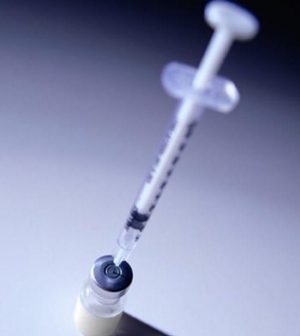- Recognizing the Signs of Hypothyroidism
- 10 Strategies to Overcome Insomnia
- Could Artificial Sweeteners Be Aging the Brain Faster?
- Techniques for Soothing Your Nervous System
- Does the Water in Your House Smell Funny? Here’s Why
- Can a Daily Dose of Apple Cider Vinegar Actually Aid Weight Loss?
- 6 Health Beverages That Can Actually Spike Your Blood Sugar
- Treatment Options for Social Anxiety Disorder
- Understanding the Connection Between Anxiety and Depression
- How Daily Prunes Can Influence Cholesterol and Inflammation
New Treatment Fights Rare Cases of Vaccine-Linked Blood Clots

Very rarely, blood clots can develop after COVID-19 vaccination, and doctors in Canada describe a new test and treatment for the condition in a case study of three patients.
All three developed the condition called vaccine-induced immune thrombotic thrombocytopenia (VITT) after receiving the AstraZeneca vaccine.
Two developed blood clots in their legs, and the third had blood clots blocking arteries and veins inside the brain, according to researchers at McMaster University in Ontario.
The patients recovered after receiving treatment that combined anti-clotting drugs and high doses of intravenous immunoglobulin.
The study was published June 9 in the New England Journal of Medicine.
“If you were a patient with VITT, I’d be telling you we know of a treatment approach. We can diagnose it accurately with our tests, treat it and we know exactly how the treatment works,” said study author Ishac Nazy, scientific director of the McMaster Platelet Immunology Laboratory.
“Our job is to understand this disease mechanism so we can improve diagnosis and patient management. This study brings together successful lab diagnostics and patient care. It’s a true translational medicine approach, which is really our forte, bench-side to bedside,” Nazy said in a university news release.
VITT occurs when antibodies attack a blood protein called platelet factor 4 (PF4). This activates platelets in the blood, causing them to clump together and form clots, the study authors explained.
Blood samples taken from the three patients after treatment showed reduced antibody-mediated platelet activation in all of them.
The McMaster team developed an effective VITT test and treatment by building on their previous research of heparin-induced thrombocytopaenia (HIT). The two conditions are similar, but using a standard HIT antibody test to detect VITT can yield false negative results.
The researchers modified the HIT test to detect VITT-specific antibodies found in rare cases of patients who’ve received a COVID-19 vaccine.
“We now understand the mechanism that leads to platelet activation and clotting,” Nazy said.
More information
The U.S. Centers for Disease Control and Prevention has more on COVID-19 vaccines.
SOURCE: McMaster University, news release, June 9, 2021
Source: HealthDay
Copyright © 2026 HealthDay. All rights reserved.










